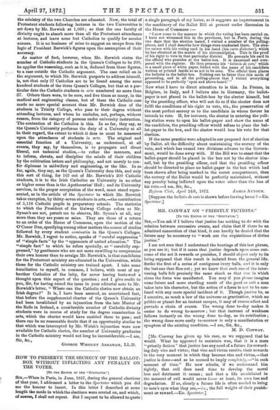HOW TO PRESERVE THE SECRECY OF THE BALLOT- BOX WITHOUT
INFLICTING ANY PENALTY ON THE VOTER.
(To THE EDITOR Or THE " SPEOTATOR.")
8m,—When in Paris, in June, 1857, during the general elections of that year, I addressed a letter to the Spectator which you did me the honour to insert. In this letter I described at some length the mode in which the elections were crrried on, and which, of course, I shall not repeat. But I request to be allowed to quote
a single paragraph of my letter, as it suggests an improvement in
the machinery of the Ballot Bill at present under discussion in the House of Commons :— "I now come to the manner in which the voting has been carried on. I have not witnessed this in the provinces, but in Paris, during the two days that the election lasted, I visited a number of the polling- places, and I shall describe how things were conducted there. The elec- tor enters with his voting card in his hand (his carte d'electeur), which he has obtained at the mairie of his circonscription. This is the proof of his right to vote in that particular district. He presents his card to the official who presides at the ballot-box. It is examined and com- pared with the register. He then presents his bulletin de vote,' which is a small piece of white paper, folded with the name of his candidate written or printed inside so as not to be seen. The official then places the bulletin in the ballot-box. Nothing can be fairer than this mode of proceeding, and in all the polling-places that I visited everything appeared to be perfectly 'open and above-board.'" Now what I have to direct attention to is this. In France, in Belgium, in Italy, and I believe also in Germany, the ballot. paper is not placed in the ballot-box by the elector himself, but by the presiding officer, who will not do so if the elector does not fulfil the conditions of his right to vote, viz., the preservation of
the most perfect secrecy as to the candidate in whose favour he intends to vote. If, for instance, the elector in entering the poll-
ing station were to open his ballot-paper and show the name of the candidate, the presiding officer would refuse to place the bal- lot-paper in the box, and the elector would lose his vote for that election.
If the same practice were adopted incur proposed Act of election by Ballot, all the difficulty about maintaining the secrecy of the vote, and which has caused two divisions adverse to the Govern- ment, would be done away with. If the Bill was to enact that the ballot-paper should be placed in the box not by the elector him- self, but by the presiding officer, and that the presiding officer
&weld be directed to place no ballot-paper in the box which had been shown after being marked in the secret compartment, then the secrecy of the Ballot would be perfectly maintained, without any penalty being inflicted upon the voter other than the loss of
his vote.—I am, Sir, &c.,
Reform Club, April 24th, 1872. JAMES ATTOnti. [Suppose the bulletin de vote is shown before leaving home ?—En. Spectator.]


































 Previous page
Previous page